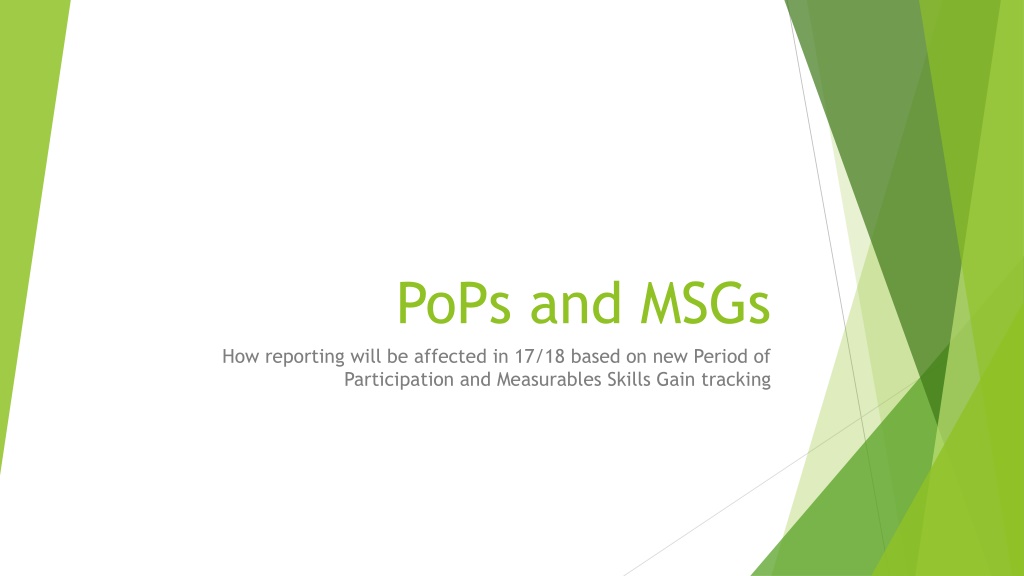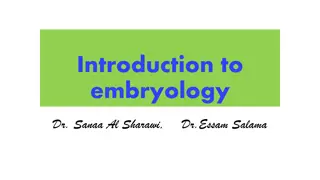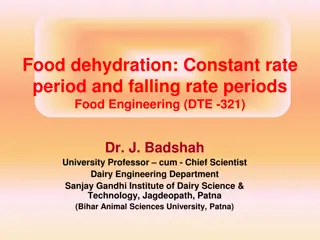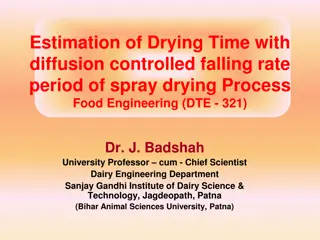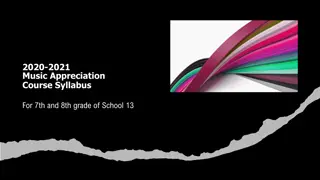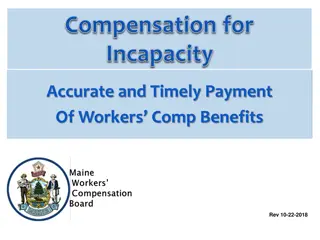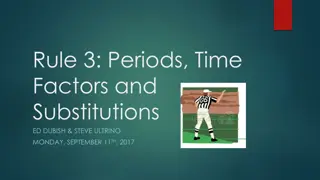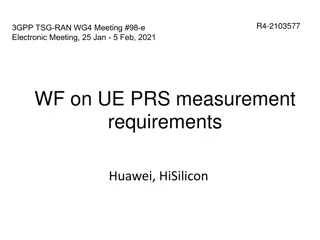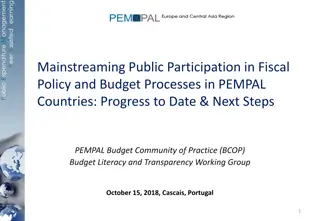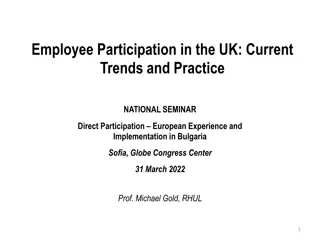Understanding the Impact of New Periods of Participation and Measurables Skills Gain Tracking
The reporting in 17/18 will be influenced by changes in Periods of Participation (PoPs) and Measurables Skills Gain tracking. Updates and clarifications highlight implications regarding PoPs, placement, and posttest gains. Key points include when PoPs begin, participant status criteria, and continuous enrollment implications. Changes to reporting of Measurable Skills Gain in a prior PoP are outlined to maintain proper testing practices. The provided images visually illustrate the concepts discussed.
Download Presentation

Please find below an Image/Link to download the presentation.
The content on the website is provided AS IS for your information and personal use only. It may not be sold, licensed, or shared on other websites without obtaining consent from the author. Download presentation by click this link. If you encounter any issues during the download, it is possible that the publisher has removed the file from their server.
E N D
Presentation Transcript
PoPs and MSGs How reporting will be affected in 17/18 based on new Period of Participation and Measurables Skills Gain tracking
Updates and Clarifications Periods of Participation (PoPs) and Assessment: Carry over across PoPs and program years. Implications regarding PoPs. Placement and posttest gains.
Periods of Participation Periods of Participation begin when a person enters the program NRS participation begins when the person has 12+ hours to start a PoP. The 12 hours needed for NRS participation cannot be interrupted by a 90+ day gap. A Period of Participation ends at Program exit. Program exit is defined as 90 or more days without service and with no scheduled services. A Period of Participation does not end when a program year ends.
PoP Implications Participant Status An individual becomes a participant once he/she has attained 12 or more hours of instruction within a period of participation (PoP) Participant status is retained until exit occurs, even if that crosses a fiscal year Individuals must achieve participant status each time a new PoP begins
PoP Implications Participant Status (continued) Participants who remain continuously enrolled across multiple program years do not need to re-qualify (through attainment of 12+ hours) as a participants in new program years. Measurable Skills Gain (MSG) is reported at least once for every participant per program year.
Changes to Reporting MSG in a Prior PoP Purpose: To ensure PoPs do not have an impact on proper testing practices, the following clarifications have been made: Educational Functioning Level (EFL) placement may be carried over from a previous PoP, IF the state accounts for this practice in the state assessment policy AND the test is still valid according to the test publisher s guidelines. You must manually push the assessment forward in order for LACES to recognize the EFL placement. EFL gain via post-testing may be achieved in a PoP based on post- testing in a subsequent PoP, assuming the test scores are still valid according to test publisher guidelines.
Reporting MSG in a Prior PoP: Scenario 1 MSG may be applied to a previous PoP under the following scenario: A participant exits PoP1, has enough hours to post-test (based on state policy and test publisher guidelines) but does not complete a post-test. The individual re-enters the program and earns 12+ hours (PoP2) and is tested at entry. Since the participant had already qualified to post-test based on on state policy and test publisher guidelines, the test given at re- entry may be used as the pre-test for PoP2 AND as a post-test with EFL gain for PoP1 if a gain is achieved.
Reporting MSG in a Prior PoP: Scenario 2 EFL Gain may also be applied to a previous PoP under this scenario: A participant exits PoP1, does not have enough hours to post-test (according to state policy and test publisher guidelines) and is not post- tested The individual returns to the program and earns 12+ hours (PoP2), and is tested after achieving enough instructional hours (combining hours in PoP1 and PoP2 if appropriate) and achieves an EFL gain. This test in PoP2 serves as the pre-test for PoP2 and as a post-test for PoP1. The EFL gain may be counted for PoP1. EFL gain in PoP2 would require another assessment after the participant receives sufficient instructional hours for a post-test.
Reporting MSG in Prior PoP: Requirements In order to apply MSG across PoPs via pre-/post-testing: The participant must have sufficient hours to post-test according to state policy and test publisher guidelines from PoP1 or combined PoP1+PoP2 The PoPs must be in the same program year. MSG cannot be retroactively applied to a prior program year.
Assessments: Placement and EFL Gain
Setting Initial Placement for Assessment and EFL EFFECTIVE JULY 1, 2017: Initial Placement is the first student placement assigned during the program year. Initial placement for a program year may be set using any subject area of pre- tests given. NRS will no longer indicate placement only in the lowest subject area of all tests. LACES will continue to do initial placement based on lowest EFL but allow for manual over-ride. The EFL for initial placement should be locked in upon assignment to ensure accurate data reporting.
Assessment and EFL: Reporting based on Initial Placement All participant data reported on NRS Table 4 will be reported on the row based on the initial placement for a given program year. Only Columns I and J will be updated on NRS Table 4 for subsequent PoPs. Column C on Table 4 includes total attendance hours from all PoPs.
